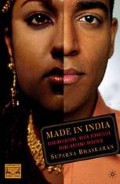Abstract
I write this chapter with primarily Third World/people of color in U.S. anthropology in mind: foreign-born, diasporic, and U.S. born. I will refer to them as anthropology’s Curdled Others who have consciously and variously marked their practices, realities, and identities as hyphenated, virtual, native, halfie, or hybrid.3 They are atypical Others in that they are academics within the U.S. anthropological and educational establishments. Most identify as persons of color and many exist at multiple intersections of marginalized racial, sexual, gendered, classed, and national citizenship. This conscious marking of oneself as hyphenated, hybrid, halfie, and virtual has been the most evident by those racialized Curdled Others who have confronted the realities of themselves working with or studying traditionally ethnographically witnessed communities—often increasingly seen as one’s “own.” Additionally, many of these Curdled Others are variously placed along the privileged spectrums of research and teaching schools and tenured-status, degree granting institutions, and citizenship. I use the term Curdled Otherness to highlight a dialectic. First, taking my queue from feminist ethnographers I recognize the potential limitations of using insider versus outsider in any pure organic sense.
Experience is, in this approach, not the origin of our explanation, but that which we want to explain.
(Joan Scott, “The Evidence of Experience”)1
A discipline in which “experience” is so central has been surprisingly unfriendly to the notion that “experience” is constantly refigured by memory. If an anthropologist can “write up” an ethnography based on data collected during doctoral fieldwork twenty or thirty years ago, why should it not be possible for “natives” to “write up” an ethnography based on their lives?
(Gupta and Ferguson)2
Access this chapter
Tax calculation will be finalised at checkout
Purchases are for personal use only
Preview
Unable to display preview. Download preview PDF.
Notes
Joan Scott, Gender and the Politics of History, New York: Columbia University Press, 1988, p. 412.
Akhil Gupta and James Ferguson, ed., Anthropological Locations: Boundaries and Grounds of a Field Science, Berkeley: University of California Press, 1997.
Kirin Narayan, Saints, Scoundrels and Storytellers: Folk Narrative in Hindu Religious Teaching, Philadelphia: University of Pennsylvania Press, 1989. In this ethnography, Narayan researched songs and lives of women living in the Himalayan foothills, a place she visited annually since she was fifteen and where her German-American mother settled down to live.
Copyright information
© 2004 Suparna Bhaskaran
About this chapter
Cite this chapter
Bhaskaran, S. (2004). The Evidence of Arrogant Experience: Boomerang Anthropology and Curdled Otherness. In: Made in India. Comparative Feminist Studies Series. Palgrave Macmillan, New York. https://doi.org/10.1057/9781403979254_2
Download citation
DOI: https://doi.org/10.1057/9781403979254_2
Publisher Name: Palgrave Macmillan, New York
Print ISBN: 978-1-4039-6726-8
Online ISBN: 978-1-4039-7925-4
eBook Packages: Palgrave Social & Cultural Studies CollectionSocial Sciences (R0)

